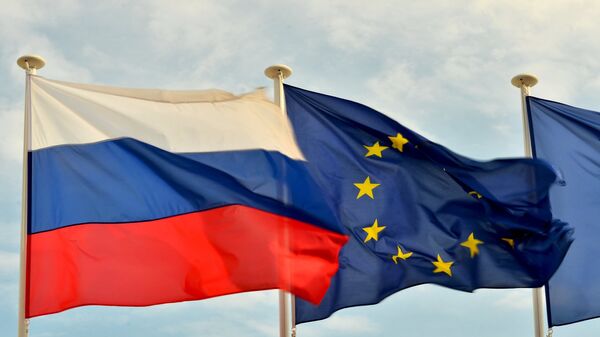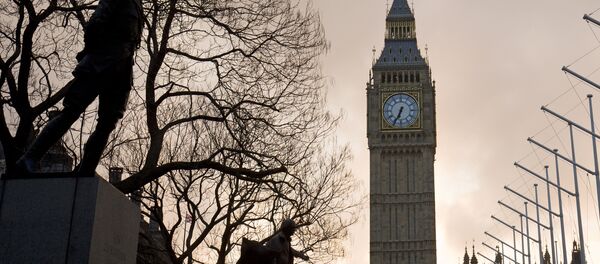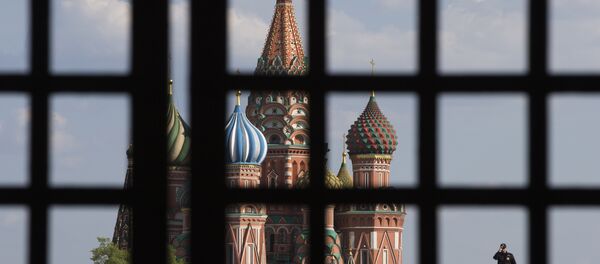Some forms of prejudice are completely acceptable in "progressive, anti-racist" western society — and indulging in them will actually boost — and not hinder your career.
One of them is Russophobia.
I was looking forward to having a break, at least for a few hours, from the anti-Russian conspiracy theories and the crude Russophobia currently doing the rounds.
But there was to be no respite. Behind me on the train sat a young man — who I presumed from his garb, his accent and confident manner, to be an Oxford University student — and a lady, who later transpired was a Japanese-American tourist from Chicago. They were talking rather loudly — about Russia.
The lady had been to Russia and absolutely hated it. The Russians are "very conservative," she told her fellow traveler. "They're not like us at all!" (OMG! do they have horns coming out of their head, I wondered?)
"Oh yes, I know," the Oxford student replied. He had seen a television documentary — or read something (I couldn't quite hear that bit), about the forthcoming football World Cup, and how the sponsors had to make sure that all the people they used were all "white" and "didn't look gay."
"I've heard that only if you look white and non-gay will you avoid being harassed and persecuted in Russia," the "educated" young man said.
He added that "of course the story might not be true, but what the hell!"
He also said he didn't understand why anyone would want to go to Russia. A British comedian had apparently said he had gone there, and within a few hours accidentally became a member of the Mafia. Everyone's Mafia there you see.
The message was clear: "Russia is a terrible place. Russians aren't normal… They're all racist, homophobic Mafiosos! Agh!"
These people were talking quite loudly — which got me thinking. Would they have been so relaxed about attacking other countries, people in a public place?
The point is not that Russia shouldn't be criticized — of course it should, like anywhere else — it's that their comments were so ludicrous, so over the top, that if they'd been made about other countries, or nationalities, they'd have received a serious rebuke. In the end, all they got were two rather disapproving looks from me.
Russia — outside of St. Petersburg or Moscow — may not be as "gay-friendly" as say Belgium or Denmark, but homosexuality, is not, as has been claimed, illegal in the country. The law on preventing the promotion of homosexuality to minors, which was introduced in 2013, (and which incidentally, I do not support), is remarkably similar to the so-called "Clause 28" law which existed in Britain from 1988 to 2003. But we didn't get the same attacks on Britain for being "homophobic" as we get on Russia now. I wonder why?
As for "they're all in the Mafia" — this is the 2017 version of the Cold War 1.0 "they're all in the secret police." Of course, there's a problem with organized crime in Russia as there is in many other countries — but guess what, I've been to the country three times and avoided "accidentally" joining the Mafia on each occasion. Perhaps, unlike the cited British comedian, I moved in all the wrong circles.
Downplaying Nazi crimes to pursue Russophobia — neocon revisionism hits Britain (Op-Ed by @NeilClark66) https://t.co/mGGGRbWx6E
— RT (@RT_com) November 1, 2017
The sad truth is Russophobia in Britain has been normalized. If you want to unleash your inner Alf Garnett and get off on bashing foreigners — and indulge in the most ridiculous racial stereotyping — then so long as you do it about those "evil, sinister Russkies," you'll be OK.
My experience on the train is not the first time I've overheard people, who thought they were frightfully well-educated, display prejudices against Russia. I once heard a group of students — again in Oxford, this time in a pub — loudly blaming Russia for everything. Brexit, Trump, Jeremy Corbyn, UKIP, you name it — the "KGB" were behind it all — according to these would-be intellectuals. I didn't hear them blame Putin for the cold weather, (deliberately sending it across from Siberia), but that would probably have come too, had I bothered to stay around.
The double standards are truly breathtaking when it comes to Russia-bashing.
Say everything is a CIA plot- you’re a ‘dipshit crazy conspiracy theorist’. Say everything is a Kremlin plot- you’ll get a newspaper column!
— Neil Clark (@NeilClark66) November 5, 2017
Say everything is a CIA plot, then you'll be called a "dips**t crazy conspiracy theorist." Say that everything — or indeed anything — is a Mossad plot and you'll be branded a "dips**t crazy conspiracy theorist" AND an "anti-Semite." But if you say everything is a Kremlin plot — you'll probably land yourself with a newspaper column with a "serious" newspaper (as well as a lucrative book deal and your own TV or radio series). What's more you'll be in absolutely no danger of a knock on your front door at 2am from the Neo-Con/Liberal Elite "You Can't Say That!" Thought Police.
How did we get here? It's worth pointing out that Russophobia is nothing new: it's existed for centuries. In the old Cold War it was mixed with virulent anti-communism. It went away for a while when Boris Yeltsin was in the Kremlin, drunkenly handing out state assets for peanuts to western-backed oligarchs, but returned with a vengeance after President Vladimir Putin began to take a less submissive stance towards those who wanted Russia to be transformed into a colony of the US and monopoly finance capital.
📰 Russophobia is Bigger today then 30 years ago. USA & Britain don't get it!=(Leonid Breznev is not in charge anymore) 📰 📰📰
— Euro Man & Activist (@DeyanWonder) October 26, 2017
The whole thing has gone into overdrive since Russia effectively blocked neocon plans for regime — change in Syria.
Russophobia — and this is the crucial point — doesn't come from the 'bottom' but from the top. It's peddled by elite newspapers- and Establishment-friendly commentators. People who went to the 'right' schools and the 'right' universities — and who, funnily enough, all seem to have the same publishers and literary agents. (And who, in the name of 'free speech' tweet incessantly about how Russian media channels like RT and Sputnik ought to be banned- and name and shame public figures who dare to appear on them).
I've never heard any Russophobia in Preston, Blackpool, Wolverhampton or Doncaster, but I've heard quite a lot in places (both online and offline), where assertive, well-spoken and ambitious people from the "top" schools of learning congregate. They know that bashing Russia — and Russians — won't harm their careers but actually boost them. That's why they do it.
Russia is quite a traditional society too — so for liberal hipsters — keen to show off their p.c. credentials, it's a great target.
The irony of course is at the vanguard of Russophobia are those who most routinely accuse others — usually from the "lower social classes" of being "racists."
On returning home from London I noticed in the television listings magazine a C4 program called, Trouble on the Trains. The "investigator," we're told, goes "undercover" on Britain's trains "to expose racism, homophobia and anti-Semitism by football fans on Britain's trains."
All very worthy, but will anti-Russian racism be covered? I very much doubt it. Because it's the "best people" with all the "right views," who indulge in it.
The views expressed in this article are solely those of the author and do not necessarily reflect the official position of Sputnik.
Follow Neil Clark on Twitter.
Support his Anti-Stalker Crowd-Fund.






